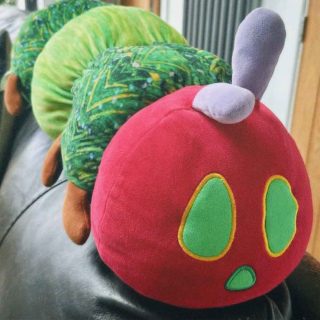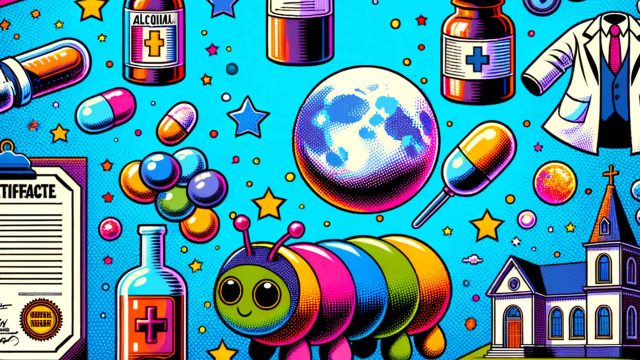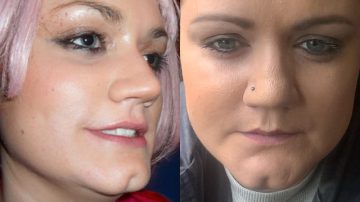There is a certain amount of judgement when people ask, ‘Why have you done that?’ The right questions would be, how did you get there? What happened to you? There is a lot more to a story than what people might know.
I guess my story began when I developed anxiety and insomnia when I was 5 years old. My dad had a brain injury with episodes and fits that made him very poorly. Sometimes he hurt my mum in the middle of the night. As a child I felt helpless and didn’t know how to protect my mum. The only thing I could do was stay awake and be there for her.
I hated myself if I fell asleep and woke up in the morning when there was a bucket and a spoon at the top of the stairs— the spoon was for when he had an epileptic to stop him swallowing his tongue. I remember from an early age that I wished my dad would swallow his tongue because we just weren’t coping.
It was nobody’s fault what happened. I had a wonderful childhood in many ways but it was like walking on eggshells all the time and not knowing when the bomb was going to go off. It felt like growing up in a minefield. I wouldn’t name it a few years ago but now I know I experienced childhood trauma.
Mental Illness and Motherhood
I had a baby when I was young which worsened my anxiety and insomnia. One of the sources of anxiety was the fear that she would stop breathing. For years I struggled a lot. The doctors gave me antidepressants and then more antidepressants. It was the only tool in the box for a long time but the problem was I didn’t feel depressed. I felt there was something else that didn’t let me sleep so I started drinking a lot of alcohol to go to sleep which I called a ‘perfect storm’. I really didn’t like alcohol but at
that time I felt that was the only thing that could help me survive; the reality was it created a bigger problem.
Although I had massively failed at school and didn’t have many qualifications, I was determined to provide a better life and a house for my daughter. I took an access course and went to university but I picked a degree and a job which were not right for me. I became a social worker dealing with horrific child abuse cases, depravity, and utter stress. I absorbed all those pains and negativity. I didn’t have much support at home to offload to, plus I had a child to look after.
I became increasingly distant from reality because I became more and more mentally ill AND still going to work every day. I kept going to doctors but they only gave me antidepressants and short-term sleeping pills which made me sick.
I still can’t believe how they left me in the community with that state I was in. The last bit of the jigsaw that led me to losing the plot was when my mum was in hospital for knee surgery. I shouldn’t have acted the way I did but it was a trigger that set the emotion of loss, loss of her, loss of everything, and loss of all senses of who I was.
I couldn’t cope with looking after my mum, going to work, looking after my daughter, being pulled by everyone all the time, and suffering from severe mental illness. I was going down and down and down. That was the start of my madness.
Breakdown and the Attempt
My breakdown was public. I got radio Sheffield involved, wrote a mandate to the government, spent £48,000, and created a nonexistent fantasy relationship with a mental health counsellor on the phone whom I had never met. The last one led me to search for him in Oxford where I ended up in a church shouting ‘I know he loves me’ as I believed we were telepathically connected. It was at that moment that I realised I was seriously ill and asked myself what I was doing on that stage in a church in Oxford while I had a child at home and a job. It was a pivotal moment.
Now I know a little more about the role of childhood trauma in creating a kind of non-existent fantasies and relationships and I think that was the accumulation of my childhood experience as well. I also know that the quest in Oxford wasn’t just about finding that man but finding the self I had lost.
Things got darker when I came back to Sheffield. When I took medication it was like a train going into a station at a hundred miles, then bang. I started deflating very quickly and the reality of having a disastrous and consequence-free life just came crashing down.
I was overwhelmed by a sense of guilt and felt like the worst person on the planet and a terrible mother. How could I possibly stay here? I come from a well-presented family with high morals but my behaviour was the opposite of everything.
When you are suicidal who do you talk to and who do you trust? Who would want to know about that? I started to think no one wanted to be near me. I desperately tried to help myself and reach out. I joined different groups including a drama group, a Buddhist group, etc. but I could see people were a bit scared as they saw I talked about suicide. Nothing changed, no matter what I did, I just had that absolutely deep dark feeling that I had to end my life and I couldn’t shake it.
I started to go into a very dark place and I didn’t know what a broken brain looked like. I was looking at people thinking why I can’t be like you, why I can’t live like you, I don’t want this life. There is an object that defines that period of my life and it is a roll of sellotape. To separate myself from the world, I sellotaped the window and the door of my bedroom and tried to turn it into a kind of box closed to normal life.

People around me didn’t realise what a dark place I was in, they kept telling me ‘you seem much better, when are you going back to work?’ This idea of ‘going back to work’ was planted in my head. In reality, I wasn’t capable of thinking about going back to work but tried to hang on to anything people told me because my brain was empty. I went back to work, felt worse, but I lied and said I was ok. I didn’t know what OK felt like anymore. I felt utterly dumb and didn’t know how to be a functioning person or a parent. I felt trapped because I felt if I failed at work, I would lose my home and everything.
On the third day of going back to work, I woke up in the morning, sent my daughter to school, and everything looked like a normal day. But it wasn’t, I felt that was the day. Instead of going to work, I went to a car park, got on the lift, and jumped off the building. The next thing I remember was being on a bed in the hospital trying hard to squeeze my daughter’s hand, to let her know ‘I am here’.
I remember an incredible force within me to stay alive, grabbing the rails of my bed like pulling myself back to life. I don’t know if it was real or imagined but I tried really hard to stay alive in that moment.
When they brought me out of the induced coma, I was in utter disbelief, the feeling of killing myself was replaced by a horrid realisation of the extent of the damage and the possibility of not being able to walk again. I remember there were loads of get-well cards and I couldn’t handle that. I need to process what happened to me.
Mental Health Services Failed Me
The processing of what happened to me has taken fifteen years and I can see now why and how it happened. There was a certain amount of anger towards Mental Health services that had to change.
They failed to see just how ill I was and sent me away. I felt let down and trapped in gaps and miscommunications in the system. There is no way I should have been left in the community on my own. How could they leave a child with a mum who was seriously ill and struggling?
If I had completed suicide, there would be a file sitting on a shelf with a lot of dust on it. They would probably have done an inquiry, but I wonder what lessons they would have learned? Nothing really seems to have changed.
What could have helped? In an ideal world, I needed to be somewhere safe, not a hospital setting necessarily, but somewhere peaceful at the seaside in a retreat or caravan with a support worker with me. It would be more cost-effective in comparison to the massive cost of my injuries and operations for the NHS.
Hope and Recovery
Recovery is a long road with lots of twists and turns during the journey. Sometimes, I wasn’t hopeful and felt like I had lost everything. My days were very silent but I tried to hang on to small things like a bird’s song.
What took me through and gave me resilience and hope was the realisation that a phone call from a friend was enough. All that mattered (and matters) was that we had each other. It gave me hope that one day it would be ok.
I learned to create a new way of thinking about life. It was enough that I was alive and breathing and stopped chasing hedonistic things in life. I just let it all go.

There were a certain amount of changes that I had to make in my life. I took responsibility by identifying and stopping things that could trigger me such as smoking, caffeine, loud music, etc.
I tried to get back in the world and do things that could help myself and others. I didn’t want to feel useless. The first time I went to town after my suicide attempt was to attend Brendan Stone’s Storying Sheffield course at the University of Sheffield. It helped me enormously to recover because it was the starting point of my life as it is now. It gave me permission to realise the power of being creative and how I could change my story as I didn’t want to be ‘That Kathryn who jumped off the building’.
I started telling my story by writing a book, Cultivating Mad Cow, and five years later I got it published. The book was the start of a journey to understand what happened to me and it wasn’t my fault. It helped me to regain my identity, that I am not the person who hurts others intentionally. As a woman and as a mother it was very important to me.
Shout and Shout and Shout
Suicide is part of life and existence. Everybody thinks about suicide in their lives but only a few people complete it. We don’t normalise suicide enough and it is still stigmatised. By addressing it and normalising it, we might help others and save lives.
Suicide hurts. If you feel you are seriously ill, if you feel you are not listened to, shout and shout and shout and make somebody listen to you. If you are not coping, just remember every feeling and emotion is temporary.
Nothing is more precious than yourself. There is always a way out and you will be able to find it. I know our brains take us to a dark place where we can’t distinguish between reality and malfunctioning, but you will feel better at some time.
This moving story by Kathryn is part of Suicide Prevention project funded by Sheffield City Council and run by Sheffield Flourish. Through one-to-one conversations short personal stories have been created, aiming to spread awareness around suicide, and break down stigma.



